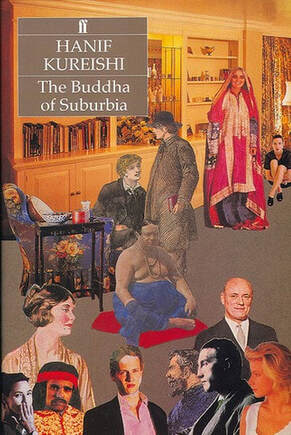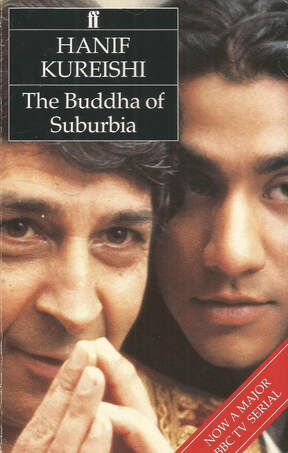|
Essay ~ Hanif Kureishi Hanif Kurieshi on Writing His First Novel All first novels are letters to one's parents, telling them how it was for you, an account of things they didn't understand or didn't want to hear, saying what couldn't be said, providing them with a bigger picture. It was the late 80s, and I was in my early 30s, when I began to work on The Buddha of Suburbia. The two films I'd written previously, My Beautiful Laundrette and Sammy and Rosie Get Laid, had bought me time and money. The success of My Beautiful Laundrette had given me confidence that the writing tone I'd found could be extended into the novel I’d wanted to write as a teenager. I had been no good at school, but always felt more alive than the people around me. I was a horny bookworm, and novels got through to me. I thought I'd do one. I did several. They were not published. But I did write what became the first chapter of The Buddha of Suburbia, as a short story for the London Review of Books, published in 1987. I believed that was that. Then I kept thinking there was more material. I had an intense experience which can happen to writers, when you understand that your subject is right there; you have lived it already, and that world is waiting to be converted into scenes. If people were not writing books about people like me, I'd write one myself, spitting out all the painful things, rudely, lightly. Someone said to me, write your pleasure. I did. Reading the first paragraph of The Buddha now, I'm surprised to notice that the hero, Karim Amir, announces his nationality three times. I guess he was insecure. Like David Bowie, he was eager to find an identity, throw it away, and start again next day with another one, brand new. In 2015, Zadie Smith wrote a lovely introduction to my novel. She describes discovering the book at school, which she calls a first for us 'new-breeds'. She says, 'Irresponsibility is an essential element of comic writing'. And Karim Amir, my boy and avatar, who likes both boys and girls in bed, and where possible both at the same time, is determinedly wild and rash. But Karim knows something that most people don't. And what he knows is priceless: that being a person of colour isn't at all like being white. No white person walks into a room and finds it weird that there are only white people present; no white person thinks of themselves as a problem for others, a question, a perplexity. No one asks them where they're really from. Whites belong in the world. It's theirs, they own it, and they don't even appreciate it. But they do get defensive and cranky when you point it out, as you have to, repeatedly. Karim understands that being a person of colour means being bullied all the time. Yet while whites might consider themselves superior, it's more original and enjoyable being underneath, laughing up at the poverty of privilege. Karim begins to get that his disadvantage is his advantage. Then he stops caring either way. He's free. If anyone thanks me for writing The Buddha of Suburbia, or says it meant something to them, I am always grateful, since I'm reminded of how a few decent people, along with some good stories, once got me out of a bit of a jam, and into a more open world. As I think about my novel today, looking back on myself, I wish I were that boy again, free on his bike. But I know he's still in me, funny, hopeful, rarin' to go, always up for it, going somewhere. ~ (Also published in The Guardian as 'There were no books about people like me', on 25th April 2020)  Hanif Kureishi was born in Kent and read philosophy at King’s College, London. In 1981 he won the George Devine Award for his plays Outskirts and Borderline and the following year became writer in residence at the Royal Court Theatre, London. His 1984 screenplay for the film My Beautiful Laundrette was nominated for an Oscar. He also wrote the screenplays of Sammy and Rosie Get Laid (1987) and London Kills Me (1991). His short story ‘My Son the Fanatic’ was adapted as a film in 1998. Kureishi’s screenplays for The Mother in 2003 and Venus (2006) were both directed by Roger Michell. A screenplay adapted from Kureishi's novel The Black Album was published in 2009. The Buddha of Suburbia (1990) won the Whitbread Prize for Best First Novel and was produced as a four-part drama for the BBC in 1993. His second novel was The Black Album (1995). The next, Intimacy (1998), was adapted as a film in 2001, winning the Golden Bear Award at the Berlin Film festival. Gabriel’s Gift was published in 2001, Something to Tell You in 2008 , The Last Word in 2014 and The Nothing in 2017. His first collection of short stories, Love in a Blue Time, appeared in 1997, followed by Midnight All Day(1999) and The Body (2002). These all appear in his Collected Stories (2010), together with eight new stories. His collection of stories and essays Love + Hate (2015) and What Happened (2019) were published by Faber & Faber in 2015. He has also written non-fiction, including the essay collections Dreaming and Scheming: Reflections on Writing and Politics (2002) and The Word and the Bomb (2005). The memoir My Ear at his Heart: Reading my Father appeared in 2004. Hanif Kureishi was awarded the C.B.E. for his services to literature, and the Chevalier de l’Ordre des Arts des Lettres in France. His works have been translated into 36 languages. Author Photo Credit : Jose Varghese
0 Comments
Leave a Reply. |
StrandsFiction~Poetry~Translations~Reviews~Interviews~Visual Arts Archives
April 2024
Categories |


 RSS Feed
RSS Feed